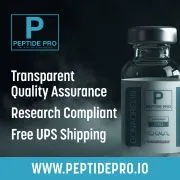Muscle Insider
New member

Ok, so maybe not the last one, but they really do make a difference in your overall health. That said, just like your credit score, they ain’t perfect.
Yes, peptides have side effects. There’s no use in lying to you, and there’s no point in you avoiding that fact.
However, the side effects are not the same for all of these amino acids. No, just like the different James Bonds throughout history, each has its own benefits and drawbacks.
(PS. Pierce Brosnan was the best, and you can’t convince me otherwise.)
Key Takeaways
- Peptides do have side effects, but it depends on which peptides you use
- Most of the side effects can be avoided by using reasonable dosages and listening to a medical professional
- Professional athletes and fitness enthusiasts who abuse the peptides are far more likely to experience the side effects
No two Peptides act identically, thus, their side effects will be different.
And so, it’s important to remember that we cannot compare two peptides directly. Another important factor to remember is that you and I are completely different.
No two humans are identical, thus, the side effects they experience will be different.
Person A might take BPC-157 and not experience any side effects, whereas person B might take BPC-157 and experience some slight abdominal pain.
However, there are some side effects most people report across almost all peptides, most of which should not cause you any real concern.
- Injection Site Reactions: One of the most common side effects of injectable peptides is local irritation or reactions at the injection site. This can include redness, swelling, pain, or itching. These reactions are usually mild and temporary, resolving on their own without intervention.
- Allergic Reactions: Some individuals may experience allergic reactions to certain peptides. Symptoms can range from mild to severe and may include rash, hives, itching, difficulty breathing, or swelling of the face, lips, tongue, or throat. This is why we start at lower doses before increasing the dose
- Gastrointestinal Disturbances: Certain peptides can affect the digestive system, leading to gastrointestinal disturbances such as nausea, vomiting, diarrhea, or stomach discomfort. These side effects are typically transient and resolve on their own.
- Headache: Headaches are a commonly reported side effect of injectable peptides. They can range from mild to moderate in intensity and usually subside without medical intervention.
- Anxiety: This will certainly not be present in all individuals, and will subside with time. Folks who are using peptides for the first time might feel nervous and anxious about doing a subcutaneous injection, however, if done correctly this is perfectly safe
There are general ‘groups’ of peptides, and while these are not identical, they seem to have similar side effects that you would need to take into account.
Peptides for Aging Side Effects Peptides for Aging include CJC-1295, Ipamorelin, Glutathione, Copper Peptides, Epithalon, Sermorelin, Human Growth Hormone (illegal), etc.
Peptides can be used for ‘anti-aging’, which refers to their ability to fix, suppress, or relieve some of the signs and effects of aging. Aging is still a natural process and no matter how much peptide therapy you use, you simply cannot reverse aging.
Some of these peptides are vastly different from one another, and while most of these will increase collagen production and cellular regenerative properties, the specific peptides are not all interchangeable.
Here are some of the sides you might experience:
- Decreased insulin sensitivity
- Slight water retention
- Loose stool
These peptides were specifically developed to increase the production of natural growth hormone. Taking pure growth hormone is illegal without a prescription, and is really only prescribed to those with a deficiency.
Here are some of the sides you might experience:
- Decreased insulin sensitivity
- Slight water retention
- Increased risk of cancer if you are predisposed to it already
These peptides are far different from one another. Some will increase blood flow to the scalp while others will decrease stress levels. Thus, there are no real side effects that are ‘shared’ amongst all of these.
Peptides for Weight Loss Side Effects Peptides for Weight Loss include Semaglutide, AOD-9604, HGH-Frag, Tesamorelin, CJC-1295, Ipamorelin, etc.
These do share quite a few properties amongst one another besides their ability to promote fat loss. They can all help with body fat and an improvement in body composition.
Here are some of the sides you might experience:
- Loose stool
- Constipation
- A great decrease in hunger (not so much a side, but still)
However, most peptides would not have ‘more’ negative effects than they would on men purely based on the hormonal system. There are some other things to consider.
- Women are (on average) lighter than men and would therefore need smaller doses of the same peptides. They have less active tissue, less muscle mass, and more fat mass, thus, they can feel the sides of peptides earlier than men
- Certain peptides do act on sex hormones and sexual function, like PT141. Whenever you engage in any peptide therapy you need to be sure there are no effects on your sex hormones you are not aware of.
- Women typically menstruate, which means water retention. If you double down and use a peptide that causes even more water retention, what you end up with is a recipe for hypertension.
Everything mentioned above still rings true, however, users would need to be even more careful now:
- Certain peptides can affect kidney function, which normal individuals can deal with, however, it can cause trouble in elderly women.
- Peptides that increase water retention need to be used carefully as elderly folks are more susceptible to hypertension.
- Lastly, any peptide that reacts badly and impairs the immune system should be avoided at all costs by elderly females. With impaired immune function, the risk of illnesses and infections is sky-high.
- Peptide Side Effects in Elderly Men
- Peptides that boost Testosterone can have an effect on cholesterol and prostate health just by their means to increase Testosterone
- Peptides that place a strain on the cardiovascular system need to be monitored carefully. Men tend to suffer from more cardiovascular illnesses than women, so, they need to be more careful
- You will likely suffer from insulin resistance, seeing as most Peptides that boost HGH production will lead to this
- Your organs might take a hit seeing as overdosing on peptides will place significant strain on the kidneys, liver, and heart
- Your cardiovascular system will also be impaired, and regular cardio is a must
Are Peptides Safe to Use? For 99% of the individuals who use them, absolutely. Most peptides on the market have undergone extensive research and trials to be approved for human usage. And even those that haven’t are simply a victim of time, not necessarily a bad result.
Your pituitary gland already releases most of the peptides you intend to use anyways, and peptide therapy is simply the replacement of what’s no longer being produced naturally.
More research is being done on peptides and their beneficial effects each and every day, and the results always come back in the same way.
Peptides are safe.
(unless you use way too much…)
Which Peptides Are Not Safe to Use? While peptide therapy and peptides themselves are safe, there are a few peptides that do pose a risk to those who want to use them.
- Melanotan II is known as the tanning peptide but is known for placing a strain on the kidneys. If you have impaired kidney function, you need to avoid this
- Peptides that increase Growth Hormone need to be monitored by those who suffer from Diabetes since they can worsen insulin resistance
- HCG (Human chorionic gonadotropin) can increase Estrogen in the body dramatically, so, be careful if you are a male
- Fat loss peptides could cause bouts of low energy, especially when combined with a low-calorie diet
Where to Buy Safe Peptides? #1 Most Researched Peptide Vendor
#1 Biggest Selection of Tested Peptides: Core PeptidesCore Peptides has recently entered the market with a wide range of over 78 peptides and blends available for purchase on their website. As a new player in the industry, they may not have Certificates of Analysis (COAs) readily available for every product just yet. However, the company has expressed its commitment to ensuring that all products are thoroughly tested and verified before being made available for purchase.
Despite being a newcomer, Core Peptides has already made a positive impression on many of its customers. Their dedication to transparency and quality control is evident in their promise to make COAs available for all products very soon. In fact, they are continuously adding new tests to their current repertoire to ensure that their products meet the highest standards possible.
It is worth noting that peptides and blends are not only becoming increasingly popular in the health and fitness industry but also other areas such as research and development. As such, the demand for high-quality and reliable sources of peptides and blends has also increased. Core Peptides seems to have recognized this growing demand and is committed to providing its customers with the best products possible.
Overall, Core Peptides’ emergence in the market is a promising development. With their growing selection of peptides and blends, dedication to transparency, and commitment to quality control, it is likely that they are establishing themselves as a trusted and reliable source for these products.
[/i]Core Peptides Overview? ? Forms: Injectable, topical, and peptide blends
? Lab Verified (COA): Mostly, but constantly being updated with new tests
? Shipping Policy: Free for $200+, Flat rate $9.95, Priority or $49.95 for Overnight
? Payment Methods: Credit cards, Venmo, Zelle, CashApp
? Guarantees: Free exchange for damaged product
? Promo Codes: 10% off with CP10
? Price (BPC157 5mg equivalent): $47
?? Rating: 4.8
?? Go to Full review
- Provides up-to-date COAs
- Various payment methods, including Bitcoin
- COAs not available on all products
- Peptide therapy via a registered clinic is perfectly legal
- Peptides purchased as ‘research chemicals’ are perfectly legal
- Certain Peptides are illegal point blank, like Human Growth Hormone
Vendors sell any peptide that is listed as a ‘research chemical’. These can be purchased by normal people, but the label must state ‘not for human use’.
FAQs Are peptides safe to use? Peptides can be safe when used appropriately and under the guidance of a qualified healthcare professional. However, like any medication or therapeutic intervention, there can be potential side effects associated with peptide therapy.
What are the common side effects of peptide therapy? The specific side effects of peptide therapy can vary depending on the type of peptide used and individual response. However, some commonly reported side effects may include injection site reactions (such as redness, swelling, or pain), headaches, nausea, fatigue, changes in appetite, or alterations in hormone levels.
Are there any long-term side effects of peptide therapy? Since peptide therapy is a relatively new field, the long-term effects of many peptides are still being studied. While most peptides are generally well-tolerated, the long-term impact of prolonged or excessive use of certain peptides is not yet fully understood.
Can peptides interact with other medications? Peptides can potentially interact with other medications. It’s important to inform your healthcare provider about any medications, supplements, or herbal remedies you are currently taking before starting peptide therapy. They can evaluate potential interactions and make necessary adjustments to ensure your safety and optimize treatment outcomes.
Click here to view the article.









